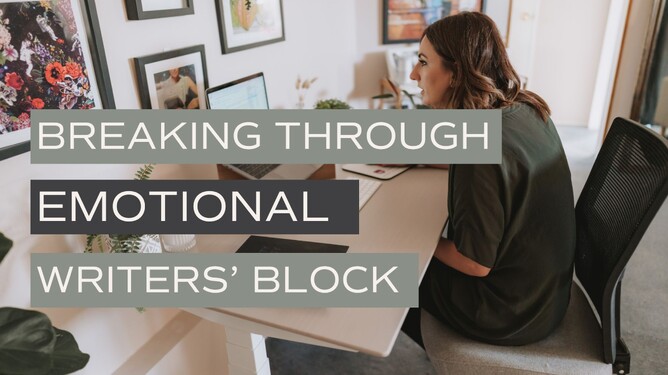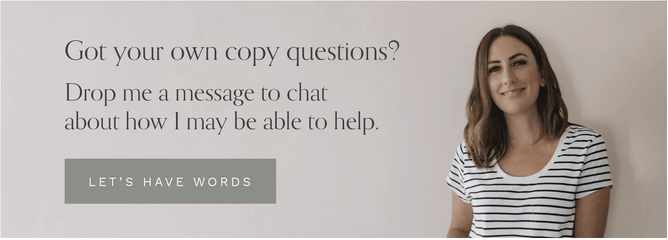When we think of writers' block, we often picture staring at a blank page, waiting for ideas to flow or searching for inspiration. The usual advice is all about generating ideas or finding ways to get words on the page—“take a walk,” “try freewriting,” “change your environment” or “take a shower” (and honestly, that last one always works a treat for me).
But for many, writers' block isn’t just about struggling to come up with ideas or stressing about sentence structure; it’s something deeper and more complicated. It’s a hesitation rooted in fear of judgement, self-doubt, and the emotional vulnerability that comes with sharing our voice.
This kind of block is less about being “out of ideas” and more about being paralysed by self-consciousness, by an inner critic whispering that our words aren’t good enough or that our ideas won’t resonate. This isn’t just traditional writers' block; it’s a deeply personal resistance to putting ourselves out there. If you’re holding back because you feel unsure, vulnerable, or afraid of how your words will be received, you’re far from alone.
Understanding emotional writers' block
Emotional writers' block often stems from self-consciousness about being vulnerable. Writing is a deeply personal act, and putting your words out into the world can feel intimidating. Common blocks might be:
Fear of judgement: Worrying about how others might perceive your ideas or writing style can lead to second-guessing every word. This fear often stops us from writing authentically.
Perfectionism: The desire to get everything “just right” can be paralysing. Perfectionism convinces us that our work isn’t ready and might never be.
Imposter phenomenon: Feeling like you’re “not a real writer” or that your words aren’t as insightful or eloquent as others’ can keep you from starting or finishing a piece.
Over-identification with your work: When we see our writing as an extension of ourselves, criticism (or the thought of it) feels personal, making it difficult to write freely.
These psychological barriers are normal, but they can stifle creativity and prevent us from sharing our voices. Breaking through these blocks requires a combination of self-awareness and practical strategies to ease the pressure.
Practical ways to move forward
Separate yourself from your work
One of the most powerful things you can do is reframe your relationship with your writing. Your words are just that—words. They’re a creation, an extension of your ideas, but they’re not you. Try seeing each piece of writing as a “draft” rather than a final product. This shift can help you let go of the need for perfection and approach writing as a flexible, evolving process.Write for yourself first
When you’re starting a new piece, try writing as though no one will ever see it. This can help silence the inner critic because there’s no pressure to impress anyone. Writing for yourself allows you to explore your voice and express your ideas without fear of judgement. Later, you can edit with your audience in mind, but in the initial draft, focus on expressing yourself honestly.Practise compassionate self-talk
Being kind to yourself may sound simple, but it can be incredibly challenging. When you notice self-critical thoughts creeping in, counter them with kinder, more supportive statements. Remind yourself that writing is a skill, and like any skill, it improves with practice. Instead of saying, “This isn’t good enough,” try, “This is a work in progress, and I’m learning with each draft.”Shift your focus from “good” to “true”
When you focus on trying to write “good” or “perfect” content, it’s easy to get stuck. Instead, focus on writing something “true”—something that authentically captures your ideas or feelings. Writing what feels true to you can be more freeing than aiming for an abstract ideal of “good,” and readers tend to connect more with authenticity than polished perfection.Set small, achievable goals
Setting huge expectations for yourself can lead to overwhelm. Instead of aiming to write a whole article or web page in one go, start with small, manageable tasks. Write a single paragraph, or set a timer for ten minutes and see what comes out. Small goals create momentum and lower the stakes, making it easier to write without pressure.Experiment with low-stakes writing
Not everything you write has to be shared or published. Try journaling, free-writing, or drafting a fun, silly piece just for yourself. When you regularly practise low-stakes writing, you build confidence and can discover your voice in a way that feels less intimidating. The more you write without judgement, the easier it becomes to approach higher-stakes projects.Identify and embrace your “why”
When you feel blocked, it’s helpful to return to why you want to write in the first place. Is it to share knowledge? Inspire others? Tell a story only you can tell? Reminding yourself of your purpose can ground you and help you push through self-doubt. When you focus on the value of your message rather than on how it might be received, you’re more likely to find the courage to keep writing.Embrace imperfection as part of the process
Every writer has imperfect drafts. Embracing imperfection is crucial for growth. Instead of seeing mistakes or awkward sentences as failures, view them as part of the process that will ultimately lead to something great. Some of the best ideas emerge in revision, but they can’t be refined if you’re afraid to put anything on the page.
Your voice matters
Remember, every writer goes through moments of doubt and self-consciousness. The key is not to eliminate these feelings but to work through them. Writing doesn’t have to be perfect to be valuable. Your unique perspective, ideas, and stories are worth sharing—even if they feel vulnerable or rough around the edges.
Take it one step at a time, practice self-compassion, and don’t be afraid to let your authentic voice shine. When you push past these emotional blocks, you open up the possibility for others to connect with your words and see the world through your lens. And in the end, that’s what makes writing so powerful.


